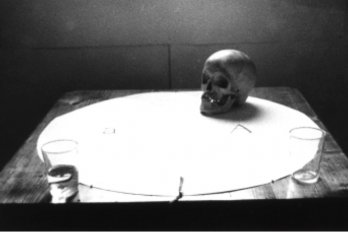Canada’s Commons chamber seems brighter in person than it does on television, bathed as it is in studio lights for CPAC cameras. The near-emerald green of the carpet and chairs is set off by gold drapes that sway behind the backbenches of each side—Government to the left, Opposition to the right. Above, the ceiling is reminiscent of decadent Versailles, with its gilded masonry and turquoise linen, broken up by the provinces’ coats of arms. I have come here for two days to see the vote on same-sex marriage, to bear witness to history.
The chamber is poorly attended on this hot afternoon, June 27, for this stage of the bill. Conservative MP Rob Moore is on his feet, pleading for the government to defend the sanctity of marriage. A smattering of Liberal, ndp, and Bloc MPs barely look up from their laptops, newspapers, and BlackBerries. The steeply sloped gallery is poorly attended too. Beside me are a few families—the parents earnest, the children bored but well-behaved. A group of plainly dressed women have their long hair pinned back and wrapped in colourful scarves. They sit next to husbands who wear ties and short-sleeved white shirts. The debate drags on. Most of the speakers are Conservatives, though a few Liberals express disapproval too. A group of young Tories sit along the backbench, laughing and occasionally jibing at the conflicted Liberals.
By early evening, a few more MPs have sauntered in. Liberal Deputy House Leader Mauril Bélanger peers in through the back curtains. Conservative MP Art Hanger strides in and mouths to a fellow Tory that a vote is coming. Bélanger enters and moves that further debate be limited to one more hour, and the third and final reading tomorrow to eight hours.
The Tories explode. “Shame!” they cry. Grizzled veterans add slurs such as “Dictatorship!” and “Democratic deficit my ass!” They thump their desks furiously. The kerchief-and-short-sleeve set seem surprised by the bellicosity of their Conservative champions.
Now the air is electric. MPs from both sides stream into the chamber. Speeches resume, with earpieces required to hear over the din. At what feels like the last possible moment, Paul Martin and the other party leaders appear. The Bloc, ndp, and most Liberals vote to end debate, accompanied by more catcalls from the Conservative benches. The Tories cheer when Liberal MPs break rank and rise to vote with defiance. The motion passes easily.
After the Speaker reads out the result, many MPs head out into the sticky night. They mill around the entrance to the Commons, silhouetted by the Hill’s powerful floodlights. Liberal MP John McCallum sits atop the low sandstone wall outside Centre Block, his jacket off, smoking. A few Bloc MPs huddle together, laughing excitedly.
The following day is a scorcher. The queue at the metal detectors is longer, the galleries noisier, the debate raging. At 8 p.m., Conservative MP Tom Lukiwski makes a final speech. So raucous is the chamber, so loud the press gallery that I can barely hear him declare that the bill represents “a very slippery slope” that could lead to polygamy.
The Speaker rises and ends the debate. Bells ring to call the vote, and within moments the floor is packed. With the theatre of Question Period over, the MPs become congenial. Separatists chat with Conservatives and New Democrats; Liberals smile and whisper with Tories. They touch each other a surprising amount: a handshake, a hand on a shoulder, kisses on both cheeks. Then MPs from both sides slam their desktops, urging procrastinators to their seats. The chamber quiets.
The moment, when it arrives, is oddly underwhelming. Clerks call out the names of the MPs as they rise to vote. Martin chats with Deputy Prime Minister Anne McLellan. Other MPs read newspapers. The roll call finishes and the Speaker declares the motion passed, as he has done a hundred times before. There’s an uneven cheer from the gallery. A few people hug, while others stare stoically, or shake their heads. On the floor below, MPs fill the green carpet between the Government and Opposition benches to continue their goodbyes. Paul Martin accepts and gives congratulations, then lumbers slowly past the Government benches, waving and chatting, until he parts the golden curtains and disappears.
Once outside, I begin the long walk down the Hill. There are no crowds, no protestors. The streets of Ottawa are muggy and deserted. Later that night, the news warns of a blackout if the heat wave continues. The Jays beat the Devil Rays. The country doesn’t feel any different. But I can tell my kids, and my students, I was here today.



